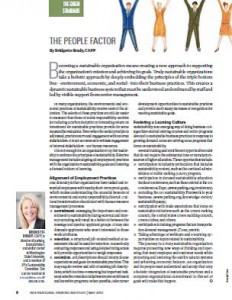Becoming a sustainable organization means creating a new approach to supporting the organization’s mission and achieving its goals. Truly sustainable organizations take a holistic approach by deeply embedding the principles of the triple bottom line—environment, economic, and social—into their business practices. This creates a dynamic sustainable business system that must be understood and embraced by staff and led by visible support from senior management.
In many organizations, the environmental and economic practices of sustainability receive most of the attention. The effects of these practices are still far easier to measure than those of social responsibility. Metrics for reducing a carbon footprint or forecasting return on investment for sustainable practices provide for some measurable evaluation. Even when the social principle is addressed, practices surround engagement with external stakeholders. It is not as common to witness engagement of internal stakeholders—our human resources.
It is not enough for an organization’s top tier leadership to embrace the principles of sustainability. Effective management includes aligning all employment practices with the organization’s sustainability goals and fostering a focused culture of learning.
Alignment of Employment Practices
One difficulty is that organizations have tasked and rewarded employees with mostly short-term profit goals, which makes understanding the financial benefits of environmental and social responsibility difficult. Cultural transformation should start with human resource management processes:
Recruitment. Messaging the importance and commitment to sustainability during external and internal recruiting will result in a better fit between the message and specific applicant groups. It may also dissuade applicants who aren’t interested in those work attributes.
Selection. A structured job-related method of assessment should be used for selection. Numerically evaluating responses and using detailed rating scales will provide opportunities to weigh responses.
Retention. Job descriptions should clearly define expectations and goals for sustainable practices. This may require review and edit of existing job descriptions, which is a time-consuming but important task. Most effective retention initiatives involve enrichment and incentive programs. When possible, offer career development opportunities in sustainable practices and provide merit salary increases or recognition for meeting sustainable goals.
Fostering a Learning Culture
Sustainability is an emerging way of doing business. Colleges have started offering courses and entire programs devoted to sustainable business practices in response to growing demand. Some are offering MBA programs that focus on sustainability.
Several training and enrichment opportunities exist that do not require the substantial time or monetary resources of higher education. These opportunities include:
Participation in industry certification that includes sustainability content, such as the Certified Administrator of Public Parking (CAPP) program.
Participation in focused sustainability education tracks at conferences, such as those offered at the IPI Conference & Expo. (www.parking.org/conference)
Including the IPI Sustainability Framwork in your business. (www.parking.org/knowledge-center/sustainability.aspx)
Participation with trade associations that focus on sustainable initiatives such as the Green Parking Council, the United States Green Building Council, Green Globes, and others.
Participation in training programs that are transportation demand management (TDM) centric.
Taking advantage of webinars and e-learning opportunities on topics related to sustainability.
The journey to a truly sustainable organization requires pioneering new ways of thinking and operating that meet employee and customer needs while protecting and restoring the earth’s natural systems and achieving economic balance. An organization and its people must understand and accept that only a holistic integration of sustainable practices and a complete organizational commitment to this set of goals will make this happen.
Bridgette Brady, CAPP, is director of parking, transportation, and visitor center at Washington State University, and a member of IPI’s Sustainability Committee. She can be reached at b.brady@wsu.edu or 509.335.5105.

